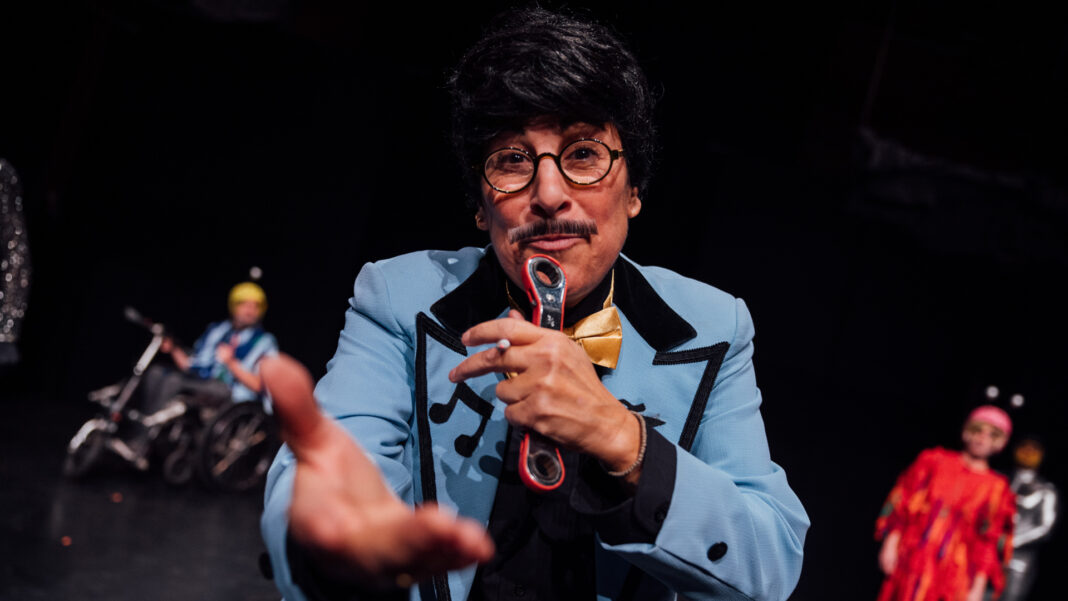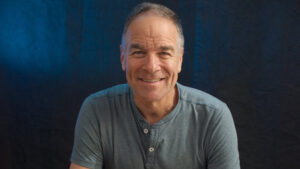
“Every clown you talk to is afraid to use the C word. It’s not easy to be a clown.” This was one of the many interesting things Stefan Haves, director and creator of Shambles at The Actors’ Gang in Culver City, told me last week. “Clown work is like improv without a net because they’ll love you or hate you in the first 30 seconds.”
Let’s face it, it’s not like horror movies haven’t created a cottage industry out of making clowns something to be feared. Nor did serial killer John Wayne Gacy who probably inspired many a horror film creator. But the best clowns (think David Shiner and Bill Irwin) have an innate ability to entertain and provoke in equal measures.
Haves knows his way around clowning. A random encounter with Shiner lead to his participation in Fool Moon, a show that featured Shiner and Irwin that was given a special Tony Award in 1999. Haves has also spent time working on several Cirque du Soleil shows.
With Shambles, a show that combines clowning with music and aerialists and drag queens and a car wash for the audience (you’ll have to see it to understand), Haves has created an ironically titled show that is full-on entertainment, but with a purpose. As we discussed in our Zoom conversation last week. What follows are excerpts from our conversation that have been edited for length and clarity.
It’s the holiday season. As we approach 2023 it seems like our world is in shambles quite a bit. Yet the tone of your show, sight unseen, seems to believe that there is still joy in the world. Is there a sense of irony in the title of this show and do you believe that there is still joy to be found in the world?
That’s a really great question because I actually pivot every interview to that. I like to say that throughout history – I’m talking all history – after a plague comes a renaissance. I knew that when we were in the middle of this dour time in the pandemic, that we’re all becoming introverted, we’re all becoming insulated, we’re all becoming fearful. Lord knows the introvert in each and every one of us has taken root and is pretty darn happy in our house.
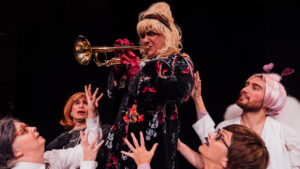
It’s going to be the artists that are going to emerge on the other side. It’s really the artist’s job to forge a new trail for everybody. I looked at it as the most amazing opportunity to assemble the world class introverts who have been not able to work for a long time. I have 17 performers in The Actors’ Gang. I have six band members and a band leader. I have six Cirque du Soleil-caliber variety performers all in the same night. I did the same kind of show ten years ago, but that was ten years ago. Life has changed.
So this one is a very gender-fluid and immersive show, which seems to be two directions that I’m learning from the newer generations. I’ve taken this opportunity to really learn and see what motivates people to get into the theater.
If I look at what’s been going on even pre-pandemic, but certainly post-pandemic, it seems that pure joy is in rare supply in the performing arts. Has the pandemic and everything that’s gone on in the past two-three years made us so entirely serious that we’ve lost our sense of humor and our sense of joy?
I’m really glad you brought this up because I teach clown and clown is in the here and now experience. So when a guy walks on stage, it’s different than improv. In improv there’s the conceit of the who, what and where, things are supposedly happening off stage. But the clown inhales and exhales with the public and discovers things in the here and now. It brings people out of that mind place and into kind of body intelligence of like what’s going on? The child is alive in all of us, asleep in a lot of us, but alive. We give a funny nod to satire in this, but then we don’t really have a point-of-view. We just want to do like a DreamWorks movie. We want to wink to a cat whose name is Feline Musk taking over planets and then we’re never going to talk about it again.
In the clowns that I’ve always loved it’s the pathos as much as the comedic timing that has attracted me them. If pathos is the flip side of comedy is there a flip side to Shambles?
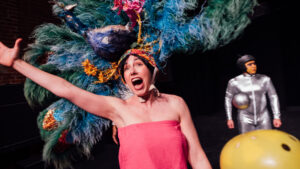
We come out like gangbusters. Laugh, laugh, laugh, laugh, laugh. All of a sudden it turns around with a song called Walking in Memphis and showing that our actual lead is a lonely man. Then it ends with Hallelujah. So the flip-flop happens, but the flip-flop happens so utterly quick. What I like to say is the clown always has to be hipper than the room. You hate clowns when they’re not like that, when they’re trying to make you laugh. You hate them. That’s why teaching clown is so hard. First 30 seconds you love ’em or hate ’em. You don’t kind of like them. If you kind of like them, you hate ’em.
What makes you laugh?
Well, laughter is a byproduct. So everybody’s like, oh clown you’re going to make me laugh. No. Buffoons make you laugh. A clown makes you happy and gives you connection. He’s not looking for a laugh. What makes you laugh? An obstacle and what is your prowess getting around that obstacle. It’s very math-oriented as opposed to I hope mommy and daddy like my skit.
The reason I ask is we’re living in a culture of political correctness and cancel culture. A lot of people who are involved in comedy and the creative arts are concerned that it’s ultimately having a stifling influence on what can be said and how it can be said. Do you have any concerns about the path that we’re headed on and whether this will have a lingering impact and a stifling impact on the creative arts?
First of all, I’m part of the problem. I’m a 63-year-old baby-boomer white male. My demographic has had a pretty good run for a few thousand years. I have to give over to the fact that for me to have that kind of power other people were marginalized. Although I love Don Rickles, I know Don Rickles wouldn’t work today. However, Don Rickles in his day was inclusive, but that was a generational change. Now do we cancel Don Rickles because he did certain things within the construct of where society was? I don’t know. It’s a tricky thing. People want to cancel Woody Allen and Woody Allen movies because of his personal behavior. Are they going to cancel Charlie Chaplin movies because of his personal behavior or is it just current comedians? So so there’s a real reckoning taking place and there’s a real conversation.
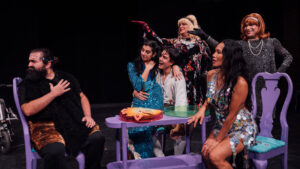
But the thing that I want to pivot from is the blame game that millennials are too fragile to understand. They’re not tough enough. I birthed these kids. So I have a responsibility to find out how we can all go forward and not complain about it; find common ground.
I even had someone say to me when I was teaching clown class “I saw a Robin Williams special. He was kind of creepy.” If you think about it it’s a white guy who’s playing Indian men, Mexicans, Blacks. He’s actually always making dick jokes. He’s doing everything. So I looked at this group of kids that I was with, and I’m like, “He is my idol. I saw him live and he was the most extraordinary being I’ve ever seen.” He fused clown and stand-up.
I said to these kids, “Who do you have today? Let me see and explain to me what it is.” They couldn’t tell me. So I think it’s a slow process of finding who the next person is going to hold the mantle and go across so everybody will be together. But I can’t be judgmental about it.
As you’re discussing Robin Williams I’m thinking he falls under the category, for me, of somebody who was an equal-opportunity offender, which is part of the tradition of comedy.
Absolutely. if you take away archetypes, commedia dell’arte is nothing. If I can’t do a stereotype, I’m dead.
I saw Bill Irwin in Fool Moon. Then I saw his Tony Award-winning performance in Who’s Afraid of Virginia Woolf? It gets my mind thinking about the skill set that a clown has to have to be able to pull off both those shows. What do you think we can learn about clowns vis-á-vis someone like Bill Irwin mastering the clowning that he does in Samuel Beckett’s work, that he did in Fool Moon and then have ability to pull off Edward Albee’s dialogue?
We’re talking about a passionate man who loves performance, studies the greats and comedy. It’s very interesting because another thing about working with both Dave and Bill is David is all about flow. Bill is all about structure. David’s the kind of guy who’s like, let me get out there. When I’m in front of the audience it’s going to happen. Bill is give me the structure in which I can kill. That’s an interesting way to look at at different actors. Are you flow-based or are you structure-based? Those guys were the perfect combination for one another. Bill would discipline David and David would take Bill into the histrionic crazy.
What joy does putting together a show like Shambles give you and how do you think that radiates from you through your ensemble and into the audience?
This is the Bermuda Triangle of depression. Between Thanksgiving, Christmas and New Year’s is the time where people feel more isolated, more marginalized. More a microscope on our dysfunctional families. I had a trauma as a kid. My father died around this time when I was nine years old. 40 years ago when I did that first Cardigan Christmas show, I’m like, Oh, these are the people I want to spend the holidays with and we want to invite the rest of our family into the theater.
To actually create a utopian holiday, a theoretic community, for these three weeks, I think that’s a way more healthy place for me to be. All of us in this place, 35 people, we’re the best of us for the hours we’re there. We’re all the best of us and we’re providing and gifting the best of us to other people here in Los Angeles.
Shambles runs at The Actors’ Gang through December 31st.
Photo: Gina Belafonte in Shambles (Photo courtesy The Actors’ Gang)











